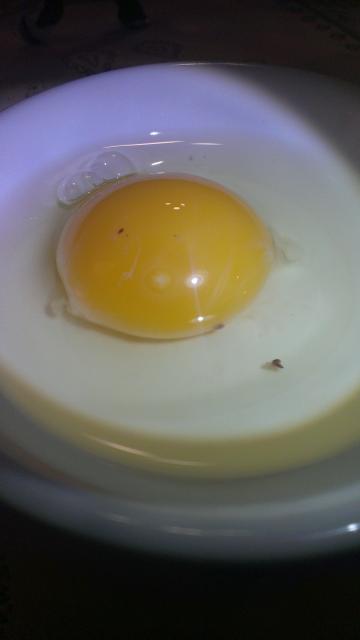I did post else where about my new silkies who have been bought to be mama hens (too many blackouts to risk an incubator here!). They have been with a rooster so I am going out on a limb and going to try to keep their eggs if they are fertile in the hope that one of them may decide to go broody - Hermione starting laying on Tuesday and I have had 2 eggs - this is a picture of egg 1. I have looked at lots of pictures and I think I can call this as being fertile - what do you think (I'm a newbie so quite prepared to be totally wrong!)?

If this is fertile, how should I store the eggs to give my girls the longest chance to go broody? I'm hoping the warmer weather, better diets and accommodation than they had until 12 days ago and longer days may work with me on this one. On my other thread I was explained it is a 2 week zone after rooster contact so I only have 2 more days of potential eggs if it is exactly 2 weeks.
Any tips on encouraging silkies to go broody?
Thanks in advance.

If this is fertile, how should I store the eggs to give my girls the longest chance to go broody? I'm hoping the warmer weather, better diets and accommodation than they had until 12 days ago and longer days may work with me on this one. On my other thread I was explained it is a 2 week zone after rooster contact so I only have 2 more days of potential eggs if it is exactly 2 weeks.
Any tips on encouraging silkies to go broody?
Thanks in advance.




 . This was the first egg she laid on Tuesday that I opened and I'm pretty sure (got hubby with his shortsightedness to look too and he said there is definitely a dot) it looks fertile.
. This was the first egg she laid on Tuesday that I opened and I'm pretty sure (got hubby with his shortsightedness to look too and he said there is definitely a dot) it looks fertile.  ) and they are now upside down in an egg carton on a stack of books on one end. They are in our unheated, very thick stone walled guest-bedroom - this stays a very constant temp which I wouldn't think would be much above 13 degrees so I'm happy that those conditions are right! If I'm lucky and get an egg today and tomorrow that would bring it up to 4 eggs to potentially put under one of them. I'll give them 2 weeks from today and if they haven't gone broody I'll have scrambled eggs and wait until they do and buy some eggs of varieties I want in for them to sit on (or if they leave it to the last minute I could potentially grab some eggs off my neighbours who have lovely chickens and roosters to up the numbers!). How many is the ideal number - is it possible to not have enough for heat / breakage reasons?
) and they are now upside down in an egg carton on a stack of books on one end. They are in our unheated, very thick stone walled guest-bedroom - this stays a very constant temp which I wouldn't think would be much above 13 degrees so I'm happy that those conditions are right! If I'm lucky and get an egg today and tomorrow that would bring it up to 4 eggs to potentially put under one of them. I'll give them 2 weeks from today and if they haven't gone broody I'll have scrambled eggs and wait until they do and buy some eggs of varieties I want in for them to sit on (or if they leave it to the last minute I could potentially grab some eggs off my neighbours who have lovely chickens and roosters to up the numbers!). How many is the ideal number - is it possible to not have enough for heat / breakage reasons?

 totally get what you are saying - bummer LOL! But does that mean that if the girls lay eggs early next week I don't need to rush them in to the fry pan just beacuse they are past the 2 week mark? Would 3 weeks be a good compromise?
totally get what you are saying - bummer LOL! But does that mean that if the girls lay eggs early next week I don't need to rush them in to the fry pan just beacuse they are past the 2 week mark? Would 3 weeks be a good compromise? 

 - all good I can wait for them to go broody and get them some good eggs to hatch
- all good I can wait for them to go broody and get them some good eggs to hatch 